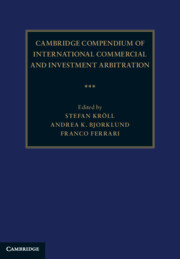Book contents
- Cambridge Compendium of International Commercial and Investment Arbitration
- Cambridge Compendium of International Commercial and Investment Arbitration
- Copyright page
- Contents
- Figures
- Tables
- Contributors
- Preface
- Part I Foundations
- Part II Public Law Questions Relating to Arbitration
- Part III Stakeholders in Arbitration
- Part IV Applicable Law
- Part V Jurisdiction of the Arbitrator
- Part VI The Arbitral Tribunal
- Part VII Procedural Questions in Arbitration
- Part VIII Role of State Courts in Arbitration
- Part IX Awards
- Part X Post-Award Issues
- Part XI Legal Concepts
- Part XII Areas of Concern
- Part XIII Arbitration and Related Fields
- 61 The Promise and Peril of Empiricism and International Investment Law Disputes
- 62 Sociology of Arbitrators
- 63 Economic Analysis of Arbitration
- 64 Teaching Arbitration
- Part XIV EU Law and Arbitration
63 - Economic Analysis of Arbitration
from Part XIII - Arbitration and Related Fields
Published online by Cambridge University Press: 18 February 2023
- Cambridge Compendium of International Commercial and Investment Arbitration
- Cambridge Compendium of International Commercial and Investment Arbitration
- Copyright page
- Contents
- Figures
- Tables
- Contributors
- Preface
- Part I Foundations
- Part II Public Law Questions Relating to Arbitration
- Part III Stakeholders in Arbitration
- Part IV Applicable Law
- Part V Jurisdiction of the Arbitrator
- Part VI The Arbitral Tribunal
- Part VII Procedural Questions in Arbitration
- Part VIII Role of State Courts in Arbitration
- Part IX Awards
- Part X Post-Award Issues
- Part XI Legal Concepts
- Part XII Areas of Concern
- Part XIII Arbitration and Related Fields
- 61 The Promise and Peril of Empiricism and International Investment Law Disputes
- 62 Sociology of Arbitrators
- 63 Economic Analysis of Arbitration
- 64 Teaching Arbitration
- Part XIV EU Law and Arbitration
Summary
From an economic point of view, the substantive law is a mechanism to generate incentives towards efficient behaviour, i.e. behaviour that maximizes the social surplus. The same applies to the legal rules that the parties agree in the contracts they make. The behavioural response that legal rules aim for depends on accurate enforcement. Litigation, arbitration and other mechanisms of dispute settlement must be viewed and evaluated as tools for the accurate enforcement of legal rules. This contribution analyzes arbitration as an efficient enforcement mechanism that may be used by the parties to maximize the surplus they jointly reap from their transactions. The paper addresses the decision to be made by the parties in choosing arbitration over litigation and other tools of ADR, but also the choice between institutional and ad hoc arbitration. As it turns out, the parameters that influence these choices differ, depending on the domestic or international nature of the given transaction. However, the economics of arbitration are not only about the choices to be made by the parties. Thus, the paper also looks at the incentives faced by the arbitrators.
Keywords
- Type
- Chapter
- Information
- Publisher: Cambridge University PressPrint publication year: 2023

